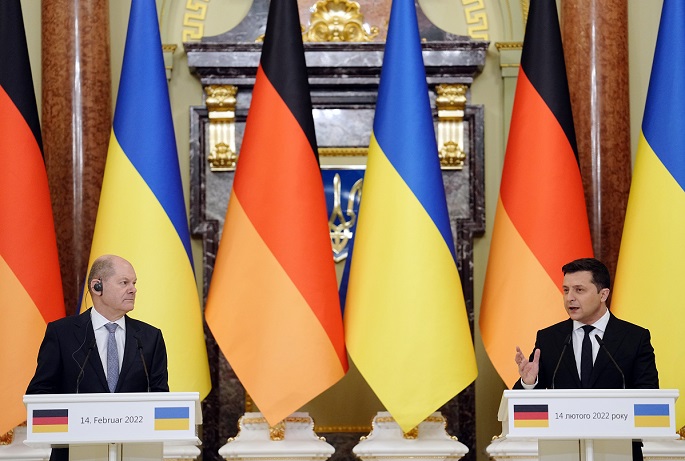Germany pledges financial aid to Ukraine, not arms
Published : 14 Feb 2022, 23:13
German Chancellor Olaf Scholz promised more financial aid to Ukraine during his trip to Kiev on Monday but held firm on Berlin's opposition to sending lethal weapons to the country.
Scholz's visit included talks with Ukrainian President Volodymyr Zelensky, which went on for longer than planned at over two hours, as the possible threat of a Russian invasion hangs over the Eastern European country.
In comments to reporters after the meeting, the German leader said his country would give an untied load of €150 million to Kiev, on top of another €150-million loan that has not yet been paid out.
"These are very serious times in which I am visiting Ukraine," said Scholz, reiterating that Germany stood firmly by Kiev's side.
No country in the world has given more financial aid to Ukraine in the past eight years than Germany, the chancellor said. More than €2 billion had been paid out in that time.
Germany has been pressed by Ukraine to provide arms, as other Western allies like the United States and Britain have done. However, Berlin's new centre-left coalition government has remained staunchly opposed to shipping lethal weapons to the country.
After Kiev, Scholz is scheduled to visit Moscow on Tuesday, where he will hold talks with Russian President Vladimir Putin.
The meetings build on a flurry of diplomacy in recent weeks as world leaders try to stave off fresh conflict in Europe.
The United States has said that Russia could be planning to invade Ukraine "at any time," citing Washington's own intelligence and pointing to the tens of thousands of Russian troops deployed along Ukraine's borders.
Despite this build-up, Russia has repeatedly denied having any intent to invade Ukraine and accuses the West of "scaremongering."
Western allies have threatened Moscow with severe economic sanctions if it invades Ukraine - a threat repeated by Scholz in Kiev on Monday.
"In the event of a military escalation, we are ready for very far-reaching and effective sanctions in coordination with our allies," he said. "If Russia violates Ukraine's territorial integrity again, we know what to do."
Russia annexed the Ukrainian peninsula of Crimea in 2014, after which war broke out in the eastern region of Donbas, where Ukrainian government troops are still battling against Moscow-backed separatists in a war that has cost tens of thousands of lives.
As tensions spiral, however, Scholz reiterated calls for dialogue in a bid to de-escalate the current stand-off.
"We are ready for a serious dialogue with Russia on issues of European security," Scholz said, voicing Germany's support for proposals put forward by NATO and the US. Now Russia is expected to respond.
Scholz thanked Ukraine "for its level-headed and restrained reaction to a very difficult and also threatening situation, which it has been dealing with for many weeks with a sense of proportion."
Some observers claim that Russia has orchestrated the crisis in order to get certain concessions from NATO. For example, Moscow has repeatedly warned the Western defence alliance against admitting Ukraine as a member.
However, Scholz said there were no immediate plans to let Ukraine join NATO.
"That is why it is somewhat peculiar to observe that the Russian government is making something that is practically not on the agenda the subject of major political problems," Scholz said.
"That is, after all, the challenge we are actually facing. That something that is not at all an issue now is being made an issue," he said.
Zelensky, for his part, said Ukraine is determined to join NATO, pointing to the fact that striving for NATO membership was anchored in the national constitution.
"Unfortunately not everything depends on us," he said.
"When we will get there, nobody knows, not even some NATO members," the president added. "We have to continue on the path we have chosen."
Scholz's Ukraine visit came as Germany sent reinforcements to a NATO battle group under its command in Lithuania, as part of efforts to bolster the defence alliance's eastern flank.
A contingent of around 100 soldiers arrived at the airport in the city of Kaunas on Monday and set off for the Rukla military base.
Germany's deployment there is set to grow to around 900 men and women in the coming days "as a clear sign of solidarity with our allies and friends," the Defence Ministry in Berlin announced.


